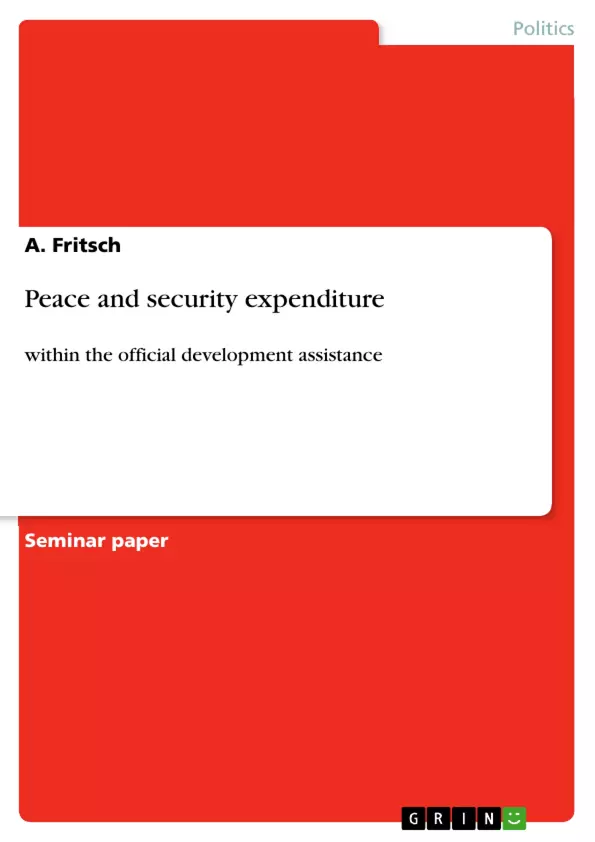The speech of former president of the United States, Harry S Truman in 1949, for the foundation of the NATO, has often also been seen as the beginning of the whole development aid engagement. In his clear words, “In addition, we will provide military advice and equipment to free nations which will cooperate with us in the maintenance of peace and security. Fourth, we must embark on a bold new program for making the benefits of our scientific advances and industrial progress available for the improvement and growth of underdeveloped areas.“
Although die international system changed dramatically, old enemies vanished, whereas new ones arose, the issue of security is still, and since September 9/11 will be an even more essential topic within the discussion of development.
It is to emanate that this close linkage between development and security has always had an impact on the behavior of the donor community, and is now once again in the focus of a debate concerning new approaches such as the security sector reform (SSR) and a broadening of the ODA definition due to the rising demand of peace and security in the development business.
Inhaltsverzeichnis (Table of Contents)
- Introduction
- Evolution of terms
- Security sector debate – state of affairs
- Implication
- Conclusions
Zielsetzung und Themenschwerpunkte (Objectives and Key Themes)
This paper examines the evolving relationship between development aid and security expenditure, particularly within the framework of Official Development Assistance (ODA). It analyzes how the changing international landscape and the growing importance of peace and security have influenced the definition and application of ODA, leading to a broader understanding of development and the emergence of security sector reform (SSR) as a key component.
- The evolving definition and application of ODA in the context of peace and security.
- The historical development of the security sector debate and the emergence of SSR.
- The impact of security sector reform on the definition and eligibility of ODA.
- The role of donor agencies and the OECD/DAC in shaping and implementing security-related development strategies.
- The challenges and opportunities of integrating security sector reform into broader development frameworks.
Zusammenfassung der Kapitel (Chapter Summaries)
- Introduction: This chapter introduces the historical connection between development aid and security, highlighting the speech of former US President Harry S. Truman in 1949 as a foundational moment. It emphasizes the ongoing relevance of security in the context of development, particularly in light of the September 11 attacks.
- Evolution of terms: This chapter explores the development of the Official Development Assistance (ODA) definition and its evolution over time. It examines how the definition has been adapted to accommodate changing political environments, broadened understandings of development, and the emergence of new tools to achieve development goals. The chapter focuses on the challenges of defining eligible ODA flows, particularly concerning peace and security expenditures.
- The security sector debate – state of affairs: This chapter delves into the contemporary security sector debate, emphasizing the growing importance of good governance and public sector management. It highlights the concept of "security sector reform" as a crucial element in preventing violent conflict and promoting transparency and the rule of law. The chapter explores the mainstreaming of SSR within a whole-of-government approach, emphasizing the challenges and opportunities of combining ODA-eligible and non-ODA-eligible funding.
Schlüsselwörter (Keywords)
This paper focuses on key terms and concepts related to development aid, security sector reform, and the evolving definition of Official Development Assistance (ODA). Key themes include the changing international environment, the growing importance of peace and security in development, the broadening of development goals, and the challenges of defining and allocating resources for security sector reform. The paper examines the role of donor agencies, the OECD/DAC, and international organizations in shaping and implementing security-related development strategies, emphasizing the need for a comprehensive and integrated approach.
Frequently Asked Questions
What is the historical starting point for development aid linked to security?
Former US President Harry S. Truman's 1949 speech, which laid the foundation for NATO and a program for industrial progress in underdeveloped areas, is seen as the beginning of this engagement.
How did the 9/11 attacks impact the development-security debate?
Since September 11, 2001, security has become an even more essential topic within development discussions, reinforcing the close linkage between the two fields.
What is Security Sector Reform (SSR)?
SSR is a key approach focused on good governance, transparency, and the rule of law within a country's security structures to prevent conflict and promote development.
What is ODA and how is its definition changing?
Official Development Assistance (ODA) defines eligible aid flows. The definition is currently broadening to include peace and security expenditures that were previously excluded.
What role does the OECD/DAC play in this context?
The OECD/DAC (Development Assistance Committee) is responsible for shaping and implementing the criteria for ODA eligibility, particularly regarding security-related development strategies.
- Arbeit zitieren
- A. Fritsch (Autor:in), 2007, Peace and security expenditure, München, GRIN Verlag, https://www.grin.com/document/82782



